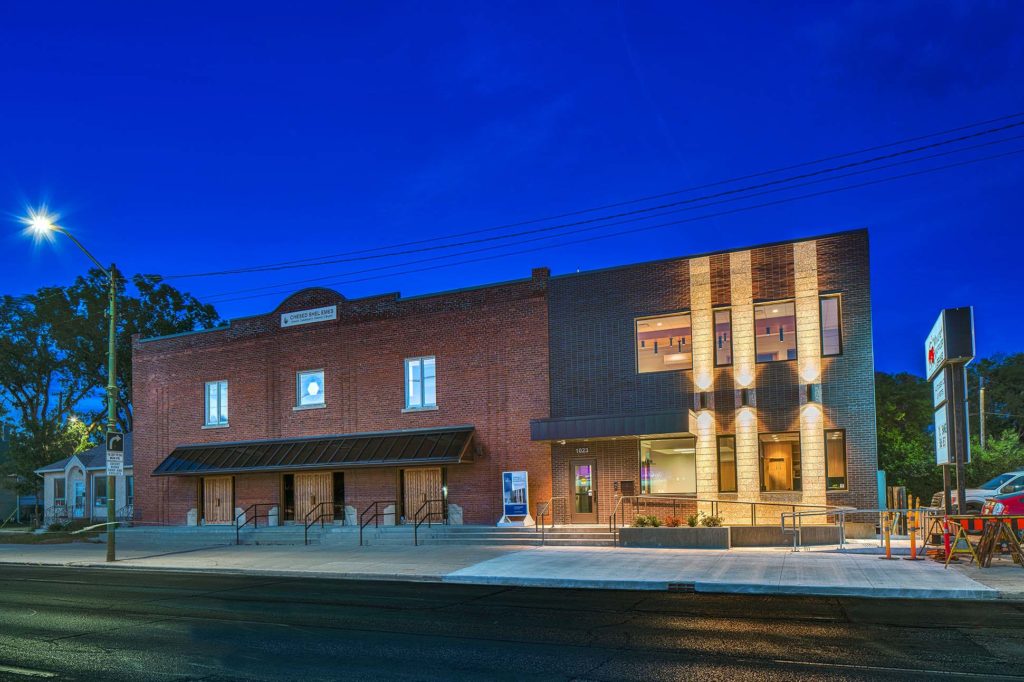Local News
Record crowd of 50,000 turns out for pro-Israel Toronto event

By DAVE GORDON (June 11, 2024 / JNS) More than 50,000 pro-Israel people turned out for the UJA Walk with Israel in Toronto on Sunday, a record turnout for the event which is in its 55th year.
Adam Hummel, a lawyer in Toronto, told JNS that it was “remarkable and uplifting to see so many Jews come together” this year for the 5K walk (about 3 miles.)
“I was dumbstruck how many people were gathered and feeling the energy and community, especially when we have been struck by so much sorrow,” Hummel said.
Although it seemed in prior years that people attended out of inertia, this year was different, according to Hummel.
“It felt like people needed to be there,” he said. “Because of everything we have gone through as a community, and what Israelis went through, people needed to show up to stand with Israel.”
The event, a project of the UJA Federation of Toronto, moved from the heavily-Jewish neighborhood at the Bathurst Street corridor at Lawrence Avenue to the Federation’s Sherman Campus, which was rebuilt several years ago.
Guidy Mamann also told JNS that this year’s event felt different.
“I’ve been to many, many walks for Israel since I was a kid,” the Toronto lawyer said. “Normally, people go because they want to have fun and see old faces, but I think this year it was driven by a need to go.”
“There was a sense of needing to go to this walk-a-thon because of the trauma we’ve been through together,” he said. “We needed to feel each other and see each other in large numbers. I think the community really needed that.”
Brendan Shanahan, president of the Maple Leafs, the Toronto hockey team, and the singer Montana Tucker, who sang the Israeli national anthem, were among the celebrities present.
“We are thrilled by the overwhelming support for the walk this year from our community and our friends and neighbors across Greater Toronto,” stated Jeff Rosenthal, chair of the UJA Federation of Greater Toronto. “To see a record-breaking turnout this year speaks volumes about our community’s pride, resilience and determination to show our city who we are and what we stand for.”
Exceptions for Jews
Michael Kerzner, the solicitor general of Ontario, and Melissa Lantsman, deputy leader of the Conservative Party, attended the event. Canadian Prime Minister Justin Trudeau and Olivia Chow, Toronto’s first Chinese-Canadian mayor, reportedly were not present.
Chow, who had skipped what she called a “divisive” annual Israeli flag raising at City Hall the prior month, said in an interview with a popular Toronto radio station on Monday morning that she had a prior commitment and couldn’t attend Sunday’s event.
“She wasn’t missed,” said David Burstein, a Toronto dentist.
“It was one of the most outstanding communal Jewish experiences of my life, and I’ve lived in Toronto my entire life. The energy was fantastic,” Burstein told JNS. “The fact that they got the four hostages out the day before, really helped morale and added to the joy of the day.”
Kevin Vuong, a federal politician of Chinese descent, told JNS that he was disappointed that Chow skipped the pro-Israel event, which she attended previously as a federal politician.
Vuong noted that Chow told the Jewish community that “you’re never alone” after a shooting at the Jewish girls’ elementary school Bais Chaya Mushka in Toronto in late May.
Chow’s statement implied that “she stood with Toronto’s Jewish community,” Vuong said. “She lied.”
“It’s clear that if it was any other community, she’d have been there. No mayor, nor prime minister for that matter, would skip an event attended by 50,000 Canadians,” Vuong added. “Unfortunately, as we’ve seen in the aftermath of Oct. 7, these so-called leaders make exceptions when it comes to Jews.”
Vuong and his wife attended the event “to show our support for Jews both here at home in Canada and abroad, and that meant walking the talk and walking the walk.”
‘I was shocked at the depravity’
The politician had harsh words for the hundreds of pro-Hamas demonstrators, who used bullhorns and loudspeakers to broadcast anti-Israel chants and Islamic prayers and who reportedly sought to enter a place where the event was taking place and had to be barred by law enforcement.
“One thing I couldn’t believe was that pro-Hamas supporters brought in speakers and blared the rocket sirens that go off when Israel is under attack,” Vuong told JNS. “I was shocked at the depravity that someone would think to do that in the hopes of triggering participants.”
“Sadly, I was not surprised when other counter-protesters gave up all pretenses and started cheering outright for Hamas,” he added.
Hummel, the Toronto lawyer, called the protesters “pathetic, paltry and sinister.”
“We celebrate life and they clearly do not. We were there in blue and white with our children, singing songs about life. There was a world of difference,” he told JNS. “They were wearing black and had their faces covered.”
“They stood with swastika signs. Repulsive and pathetic,” he added. “The visuals could not have been starker of what we’re fighting for, and what we are fighting against.”
Mamann, the other Toronto lawyer, told JNS that some of the protesters tailed Jewish community members after the event in a harassing way.
“These people come clear across town and out of town to disrupt us. The police were on our side. But at the end of the day, the protection doesn’t finish when the walk finishes,” he said. “There are thousands of people trying to make it home, and there is still work to do.”
Ali Siadatan was among the non-Jewish Canadians of Iranian descent who participated in the event to voice their support for the Jewish state.
“I stand with Israel because I wish to live in a free world. Israel is at the epicenter of a global ideological war,” Siadatan told JNS. “Israel’s victory will push back the forces of Islam and Marxism. Israel’s defeat would encourage these very forces to explode in the West and in Canada.”
“Even the future of Iran very much depends on the victory or defeat of Israel against the regional forces of Islamic militancy,” Siadatan added.
At the end of the walk, JNS caught up with the rapper Nissim Black, who performed at the festival, which also had kid-friendly activities and musical performances.
“Incredible energy,” Black told JNS. “It was so special seeing all those people together celebrating Eretz Hakodesh,” the Holy Land.
Local News
Thank you to the community from the Chesed Shel Emes

We’re delighted to share a major milestone in our Capital Campaign, “Building on our Tradition.” Launched in November 2018, this campaign aimed to replace our outdated facility with a modern space tailored to our unique needs. Our new building is designed with ritual at its core, featuring ample preparation space, Shomer space, and storage, creating a warm and welcoming environment for our community during times of need.
We’re grateful to the nearly 1,000 generous donors who contributed over $4 million towards our new facility. A $750,000 mortgage will be retired in November 2025, completing this monumental project in just seven years.
We’re also thrilled to announce that our Chesed Shel Emes Endowment Fund has grown tenfold, from $15,000 to $150,000, thanks to you, the Jewish Foundation of Manitoba’s FundMatch program, and Million Dollar Match initiative in 2024. Our fund helps ensure that everyone can have a dignified Jewish funeral regardless of financial need.
As we look to the future, our goal remains to ensure the Chevra Kadisha continues to serve our community for generations to come. Our focus now shifts to replenishing our savings account and growing our JFM Endowment fund.
We’re deeply grateful for your support over the past several years.
It’s our privilege to serve our community with care and compassion.
With sincere appreciation,
Campaign cabinet: Hillel Kravetsky, Gerry Pritchard, Stuart Pudavick,
Jack Solomon, and Rena Boroditsky
Murray S. Greenfield, President
Local News
Winnipeg Beach Synagogue about to celebrate 75th anniversary

By BERNIE BELLAN (July 13) In 1950 a group of cottage owners at Winnipeg Beach took it upon themselves to relocate a one-room schoolhouse that was in the Beausejour area to Winnipeg Beach where it became the beach synagogue at the corner of Hazel and Grove.
There it stayed until 1998 when it was moved to its current location at Camp Massad.
On August 2nd members of the synagogue will be holding a 75th anniversary celebration.

As part of the celebration anyone who is a descendant or relative of any of the original members of the first executive committee (as seen in the photo here) is invited to attend the synagogue that morning.
If you are a relative please contact Abe Borzykowski at wpgbeachshule@shaw.ca or aborzykowski@shaw.ca to let Abe know you might be attending or for more information about the 75th anniversary celebration.
We will soon be publishing a story about the history of the beach synagogue, which is something I’ve been writing about for over 25 years.
Local News
Vickar Family cuts ribbon on new Tova Vickar and Family Childcare Centre

By MYRON LOVE In the words of Larry Vickar, the Shaarey Zedek’s successful Dor V’ Dor Campaign “is not only a renewal of the synagogue but truly a renewal movement of Jewish life in our community.”An integral part of that renewal movement was the creation of a daycare centre within the expanded synagogue. On Monday, June 23, Larry and Tova Vickar cut the ribbon, thereby officially opening the Tova Vickar and Family Childcare Centre in the presence of 100 of their family members, friends and other supporters of the project.
The short program preceding the morning ribbon-cutting began with a continental breakfast followed by a welcome by both Fanny Levy, Shaarey Zedek’s Board President, and Executive Director Dr. Rena Secter Elbaze. In Elbaze’s remarks, she noted that Larry and Tova wanted their family (including son Stephen and family, who flew in from Florida) and friends at the event to celebrate the opening of the Tova Vickar and Family Childcare Centre, “not because of the accolades, but because, as Larry put it, he hopes that their investment in the congregation will inspire others to do the same.”
“When Larry and I spoke about what this gift meant to him and the message he wanted people to take away,” she continued, “I couldn’t help but connect it to the teachings of Reb Zalman Schachter-Shalomi whose book – Age-ing to Sage-ing – changes the whole way we look at the concept of ageing and basing it on our ancestral teachings.”
She explained that his concept of “Sage-ing” is based on three key ideas – Discover your meaning and purpose; accept our mortality and think about the legacy you want to leave.
“Larry spoke about these exact concepts when we met,” she said.
Elbaze also noted the presence of Shaarey Zedek’s newly-arrived senior Rabbi Carnie Rose, former Rabbi Alan Green, and area MLAs Mike Moroz and Carla Compton.
Larry Vickar expressed his great appreciation for all those in attendance. “Tova and I are deeply moved to stand here with you today for this important milestone in our community”, he said. “We are grateful to be surrounded by all of you, the people we care about, our family and friends… you who have touched our lives and played some part in our journey.”
